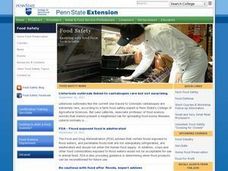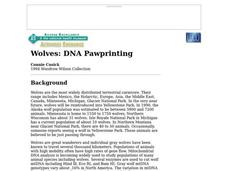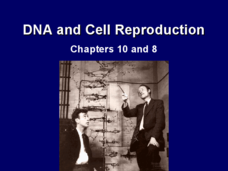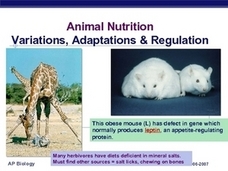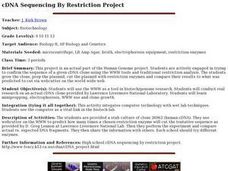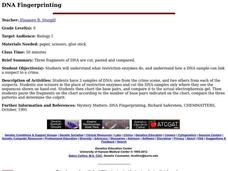Curated OER
More Basic Biotechnology Tools
You can use these slides to explain the many complicated steps of the Polymerase Chain Reaction. The diagnostic and forensic uses of gel electrophoresis are detailed. This PowerPoint could be used to communicate facts, or to prompt...
Curated OER
A Little More Advanced Biotechnology Tools: Better Plasmids
A nice set of information that will help your students understand the process of using recombinant plasmids. DNA hybridization and blotting mechanisms help illustrate expressed genes and the concepts behind the Human Genome Library....
Curated OER
A Little More Advanced Biotechnology Tools; Better Plasmids
After using this DNA and plasmids slide show, the steps of the delicate procedures of southern blotting and DNA libraries should be more clear to your students. Students will read the guidelines and are also prompted to answer questions...
Curated OER
Farm * Examination 2
In this assessment, 10th graders Match the vocabulary terms in column A with the definitions in column B. Write the letter of the definition in column B in the space next to the terms in column A. Upon completionof the first task,...
Curated OER
Got Gas? How Much?
Learners perform an experiment that measures respiration. In this performing an experiment that measures respiration lesson, students discuss aerobic and anaerobic respiration. Learners measure the gas produced by putting yeast in...
Curated OER
Alcoholic Fermentation in Yeast
Biology learners investigate the effect of sucrose concentration on yeast alcoholic fermentation. During the lesson,they compare and contrast the processes of cellular respiration and alcoholic fermentation. They design an experiment to...
Curated OER
Wolves: DNA Pawprinting
A mystery canine was shot and killed near Yellowstone National Park in the early '90s. Genetics whizzes explain how they might go about identifying whether the animal was a true grey wolf or a hybrid. A drawing of the animal's DNA bands...
Curated OER
Unit: Processing and Manufacturing: Examination Three
StudentsMatch the vocabulary terms in column A with the definitions in column B. Write the letter of the definition in column B in the space next to the terms in column A. Afterwhcich, students Write short answers or fill in the blank to...
Curated OER
Identification of Gram Negative Bacilli-IMViC
For this microbiology worksheet, students complete 9 review questions after finishing a group lab in which they perform four biochemical tests to help divide the Enterobacteriaceae into two major groups- E. coli and...
Curated OER
Identification of Gram Negative Bacilli—Oxidase
In this biology worksheet, students identify the different types of reagents being used with the samples as part of an extensive lab experiment.
Curated OER
AP: Chapter 9A: Respiration - Glycolysis
AP biologists aspire to respire with this worksheet. In it, they write short answers to 26 questions about cellular respiration. Topics addressed include the Kreb's cycle, fermentation, and more. Written as a chapter reading...
Curated OER
Producers and Consumers
Students make lists of producers and consumers and act as consumers that eat producers in a garden. In this producers and consumers lesson plan, students demonstrate a food chain by using a piece of yarn to connect all of them together.
Curated OER
DNA and Cell Reproduction
These slides have lovely images to illustrate the Double Helix and replication. The specifics of chromosomes within cells and the numbers and structure during different stages of cell replication are explained.
Curated OER
BioTechnology
The concept of electrophoresis and how it can be used to track sections of DNA that have been spliced is introduced in this slideshow. There are a few grammatical and spelling errors, but overall the slides are nicely presented.
Curated OER
Animal Nutrition - Variations, Adaptations, & Regulation
Colorful pictures and graphics make this a visually-appealing presentation on animal nutrition. Be aware that two of the sixteen slides include blank graphic organizers, so you will need to find the other existing version of this...
Curated OER
Comparison of Four-, Six-, And Eight-bp Cuts in Calf Thymus Dna
Students investigate the use of restriction enzymes to recognize a four-, six-, and eight-nucleotide sequence. They utilize restrictive endonucleases to cut Thymus DNA and compare results by viewing the DNA fragments on Agarose Gel...
Curated OER
The Cloning of Plasmid and Spinach DNA
Students will first extract genomic DNA from spinach and perform a restriction enzyme digestion on both the spinach DNA and the plasmid using the same restriction enzyme. They then ligate the cut plasmid DNA with the cut spinach DNA in...
Curated OER
cDNA Sequencing By Restriction Project
Young scholars try to confirm the sequence of a given cDNA clone using the WWW tools and traditional restriction analysis. They grow the clone, prep the plasmid, cut the plasmid with restriction enzymes and compare their results to what...
Curated OER
Cloning of Plasmid and Spinach DNA
Students ligate fragments of genomic DNA from spinach into a vector plasmid. They perform a restriction enzyme digestion. Student use a ligated DNA molecule to transform E. coli cells. Students analyze their procedures and outcome of...
Curated OER
DNA Fingerprinting
Ninth graders investigate what restriction enzymes do, and explain how a DNA sample can link a suspect to a crime.
Curated OER
Selecting Soil Organisms in Compost
Learners conduct an experiment to demonstrate that many of the enzyme systems needed to break down society's wastes exist in nature among the decomposers in a compost pile. They culture compost bacteria on starch agar to examine the...
Curated OER
Selecting Soil Organisms in Compost
Learners demonstrate that many of the enzyme systems needed to break down--and therefore clean up-society's wastes already exist in nature among the decomposers. They select the best starch-munching organisms by altering the environment...
Curated OER
DNA Recombination II
Students model recombination in DNA. They color the DNA sample and cut it out. Students use their "restriction enzymes" to cut the DNA into specific fragments. They separate the fragments using the "gel electrotrophoresis." Students...
Curated OER
Genetics and Molecular Biology
Students create DNA models using colored construction papers. In this biology lesson plan, students identify enzyme restriction sites. They model how DNA plasmids replicate when taken up by a bacterial cell.





